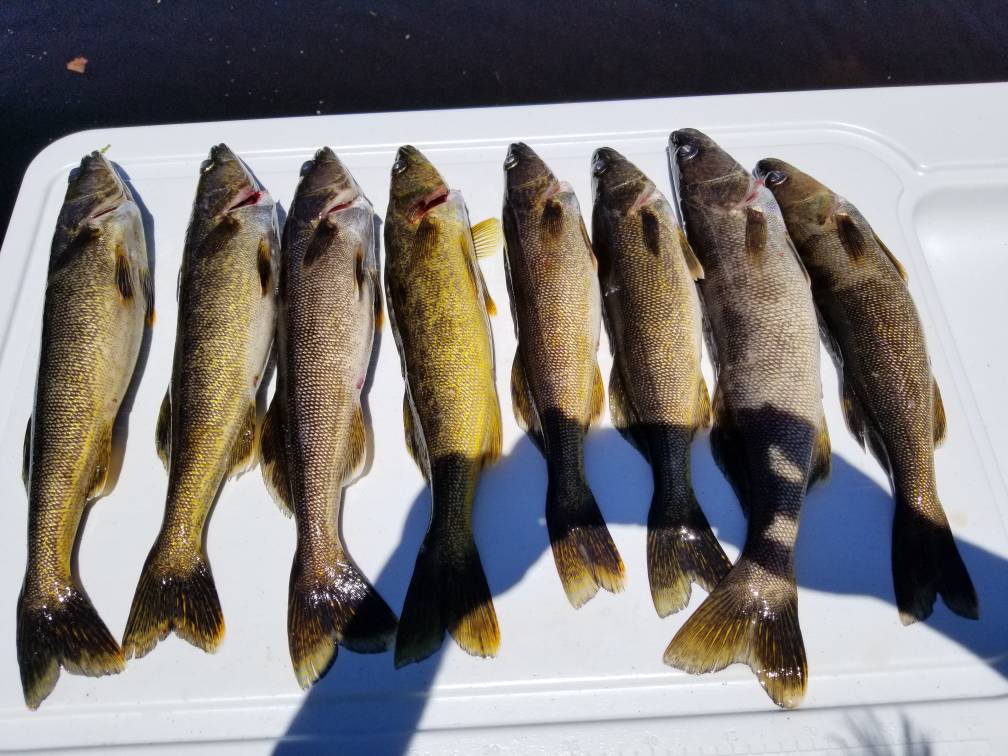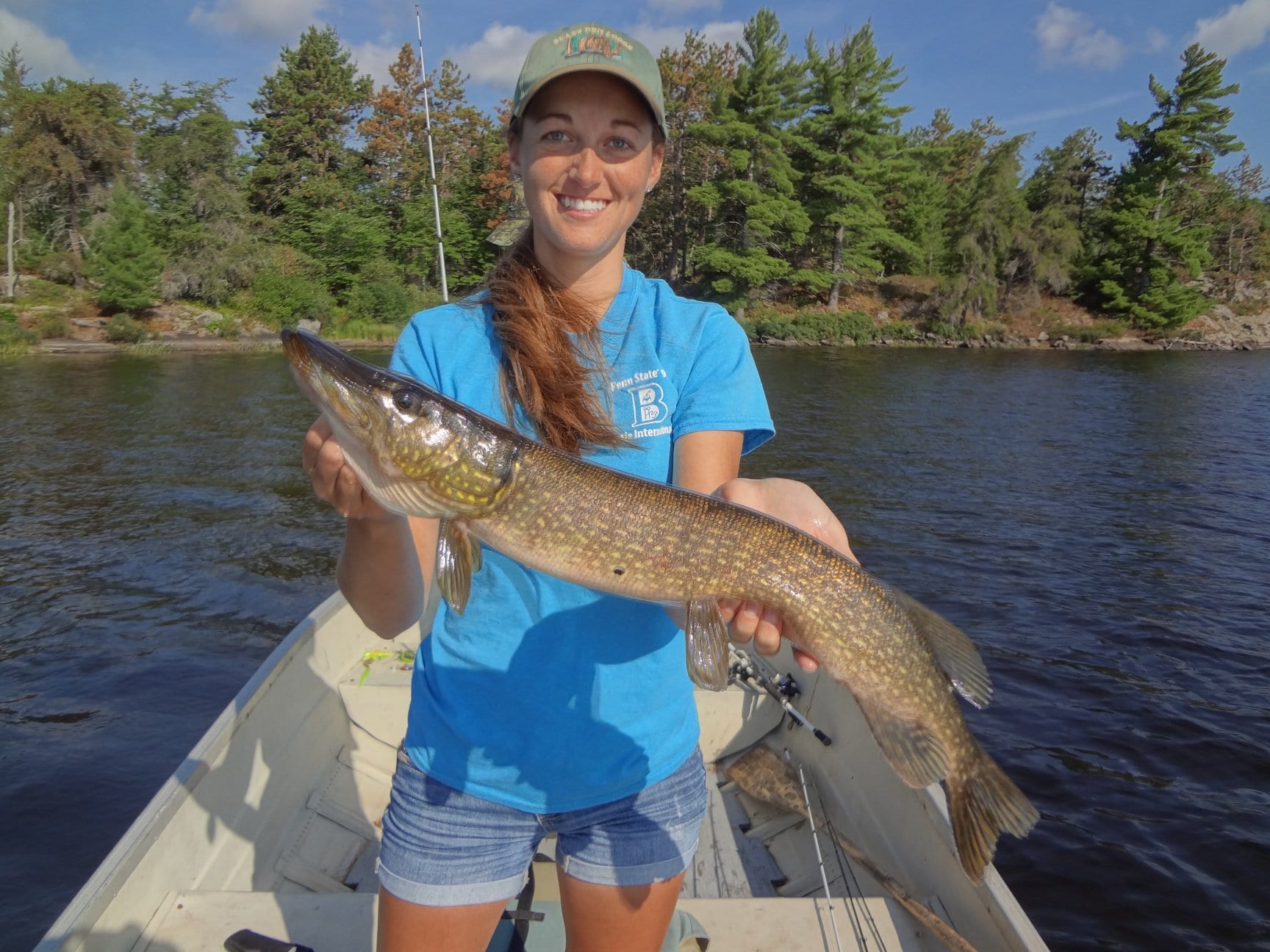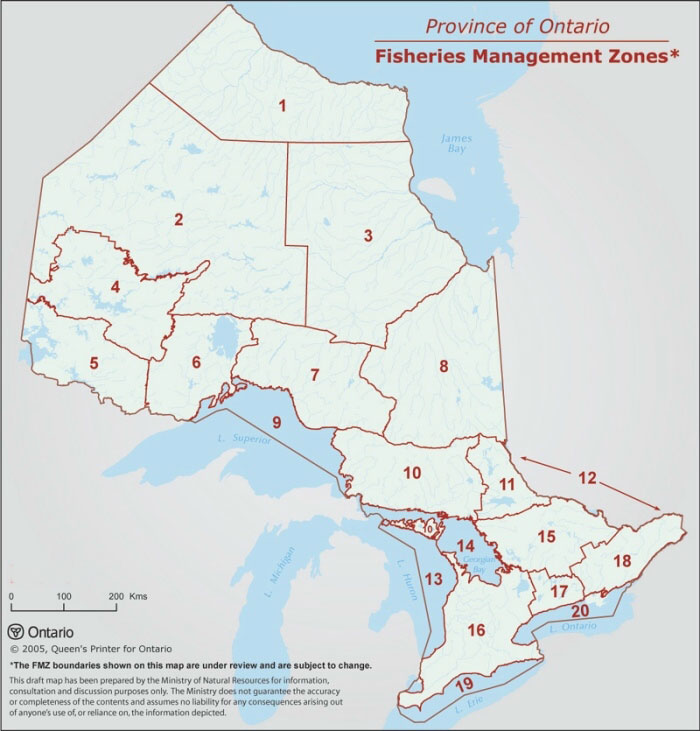Ontario Walleye Slot Size
Ontario Fishing Regulations Page:www.mnr.gov.on.ca/en/Business/LetsFish/Publication/STEL02_163615.html
There is a protected slot size. All Walleyes under 15.5' and over 19.5' need to be let go. The introduction of the slot limit has resulted in a very healthy Walleye population with many very large breeding females cruising the lake. There are plenty of Walleyes being caught over 20' and up to 25'. Ontario Walleye Northern Pike Muskie Fishing Regulations. Smallmouth Bass Regulations: Open Season: All Year Limit - Sport License: Dec. 1 to June 30, 2 in your possession less than 13.8 inches - July 1 to Nov. 30, 4 in your possession (no size limit).
Walleye & Sauger Regulations: Zone 4 Fishing Regulations (pdf) |
It’s early afternoon before we return, after releasing half a dozen walleye over the 18.1 to 23.6 inch slot size and keeping a few fish to eat. Scratching the surface of this immense system has been an ‘eye-opener and I wonder how many more walleye spots await discovery. Get all the details on ice-out walleye on Rainy River here.
Northern Pike Regulations: Zone 4 Fishing Regulations (pdf) |
Smallmouth Bass Regulations: Zone 4 Fishing Regulations (pdf) |
Muskie Regulations: Zone 4 Fishing Regulations (pdf) |
Yellow Perch Regulations: Zone 4 Fishing Regulations (pdf) |
Fishing Regulations on Rice Lake have changed somewhat beginning in 2010.
Here are the basic changes that Fishing Regulations on Rice Lake that affect zone 17 in which Rice Lake is apart of:
New Limits and slot sizes have been put into effect beginning in 2010 Fishing Season.

When it comes to Walleye (Pickerel) there has been a reduction in catch and possession limits. Previously the possession limit was 6, now it is 4 for a Sport fishing license or 1 if you have a Conservation license. There is also a slot size now in place; you are only allowed to keep fish between 35-50cm or 13.8 and 19.7”inches.
These new regulations have been put into place after monitoring of southern Ontario walleye populations has shown poor health in most areas. Size and possession limits will improve the declining walleye population and provide consistent walleye regulations across the province. The walleye season on Rice Lake runs from the second Sunday in May to November 15th 2010.
For Large or Smallmouth Bass there are no slot size limits but there are possession limits. If you have a Sport fishing license the limit (in any combination of Large or Smallmouth) is 6 fish. If you have a Conservation license then your limit is 2. The Bass season begins on the 4th Saturday in June and ends on December 15th.
For Muskellunge on Rice Lake the limit is 1 fish and it must be greater than 44” or 112 cm if you have a Sport fishing license, you are not allowed to keep any Musky if you have a Conservation license. The Musky season begins on the first Saturday in June and ends on December 15th.
New Fishing Regulations on Rice Lake for 2010 regarding Sunfish, Bluegill or Pumpkinseed will now have the following limits for Rice Lake and Zone 17. If you have a Sport Fishing License the maximum number of fish is 300 with only 30 greater than 18cm or 7.1”inches. If you have a conservation license the limit is 15 pan fish of any size.
For Yellow Perch if you have a Sport Fishing License your limit is 50 or if you have a Conservation fishing License then your limit is 25 Perch of any size.
For Black Crappie the daily limit if you possess a valid Sport Fishing License your limit is 30 fish of any size while a Conservation License will allow you to keep 10.
Panfish season beginning in January 2010 is now year round. Ice fishing begins January 1st all ice huts must be off the lake by February 28 11:59pm.
INVASIVE SPECIES ALERT: If you catch one these little devils (Pictured below) in Rice Lake don’t put it back in, let it suck air. (it’s a Goby)
The following was taken from www.sciencedaily.com and talks about this major problem now in Rice Lake Ontario.
Rice Lake Ontario Walleye Slot Size
“This invasion poses many potential threats for native species of fish and mussels,” says Mark Poos, a PhD Candidate in U of T’s Department of Ecology and Evolutionary Biology. Poos is lead author of the study published recently in the international journal Biological Invasions. Up to 89 per cent of fish species and 17 per cent of mussel species are either known or suspected to be affected by the goby invasion. Of particular concern is the impact on species that have a conservation designation, including such endangered species as the small eastern sand darter fish and mussels such as the wavy rayed lampmussel.
The Great Lakes and its tributaries are Canada’s most diverse aquatic ecosystems, but are also the most fragile, notes Poos. Several of these rivers hold species found nowhere else in Canada, including 11 endangered species and two threatened species. Furthermore, the round goby, an aggressive ground-feeder, is a threat to three globally rare species: the rayed bean, northern riffleshell and snuffbox mussels.
Round gobies entered the St. Clair River in 1990 likely through ballast water from ocean-going ships. Despite over 15 years of potential invasion through natural dispersal from the Great Lakes into tributaries, the round goby threat did not manifest itself until now. “It was previously thought that these high-diversity areas were immune to invasion. This study shows that this is likely not the case,” says Poos.

He advises anglers to be watchful for round goby and if they catch one: do not release it back into the water. Other tips to prevent the spread of round goby include not releasing live bait into the water, draining your boat before leaving any water access and never transferring fish from one location to another.
If people do catch round goby they should report the capture to http://www.invadingspecies.com.
HERE ARE SOME HELPFUL TIPS FOR RELEASING FISH AND ENSURING THEIR SURVIVAL:
1. Use barbless hooks and artificial lures (no organic bait) to prevent deep hooking.
Ontario Walleye Slot Size

2. Land fish as quickly as possible and use a rubber landing net if needed.
3. Keep the fish in the water as much as possible and handle the fish gently.
4. Wet your hands or use wet cloth gloves when handling fish out of water.
5. Do not touch the gills or eyes. Grasp the fish just behind the gill covers, or for fish without teeth (for example, bass or panfish),hold the fish by the lower lip.
6. Use long-nose pliers to remove the hook quickly without injuring the fish. If the fish is hooked deeply, cut the line and leave the hook in.
7. If you want to take a picture, be ready ahead of time, hold the fish in a horizontal position supporting its weight with your arm and hands, and take pictures quickly, minimising the time the fish is out of water.
8. When releasing the fish, hold it in the water so that it is facing into the current or if there is no current, gently move the fish in a forward direction so water flows through the gills.
9. When the fish begins to struggle, is breathing normally and can keep its balance, let it swim away.
Ontario Walleye Slot Size Chart
10. Remember that all fish not immediately released count towards’ your daily catch or possession limits.
Remember to be safe on the water and always wear your Life jacket.